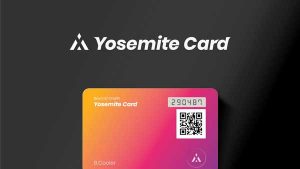Thirty-five merchants in the Silicon Valley area are accepting the new Yosemite Card, which caps acceptance fees at 0.3%. The private credit card can do that because it uses blockchain technology to manage transactions. Typical discount rates for network-branded credit cards range from 2% to 3% or more.
Palo Alto, Calif.-based Yosemite X Inc. launched the card Friday and says the card is available now to individuals with a Stanford University email address. Once approved for a Yosemite Card credit line—that decision is made internally at Yosemite and not reported to credit bureaus—users download the Yosemite Card app for an iOS or Android device. Consumers pay no fees for the account. Neither credit score nor credit history is a factor in the credit applications, the company says.

To make a transaction, the cardholder presents the Yosemite Card via the mobile app. A dynamic Quick Response code is generated that is linked to their blockchain account. The merchant scans the code to complete the payment. Receipts are sent to the cardholder’s mobile app. The card only works for face-to-face transactions, but Yosemite X expects to add e-commerce functionality eventually, along with a physical card.
On the blockchain side, Yosemite Card use so-called stablecoins that are pegged to a fiat currency, such as the U.S. dollar. This tames the volatility usually associated with cryptocurrencies
Transaction security is aided by the blockchain’s ability to store and validate transactional data, YT Kim, Yosemite X founder, said in a statement. “The accounts, every identity that is plugged into the blockchain, that are recording transactions on the blockchain, are all bundled together, making them completely immutable,” Kim says.
“This has been mathematically proven time and time again, that once on the public ledger, the recorded transaction is unhackable.” Kim said. “In addition, every individual Yosemite Card uses an OTP (one time password) generator that provides a randomized PIN-number every 30 seconds and a scannable QR code that also changes every 30 seconds. These added security benefits also make it impossible for anyone to steal a person’s credit card information. Merchants also create a passcode to access their blockchain wallet, and the number pad within the merchant app is always random to circumvent bad actors from trying to identify patterns in the merchant’s passcode.”
It’s the blockchain technology that enables the low fees. Merchants may pay no fee for a Yosemite Card transaction or as much as 0.3%, the cap.
“The card payment industry is following an outdated model that is hurting merchants and consumers, and we saw an opportunity to provide a tangible solution to both,” Kim said. “With the development of technology that can facilitate credit transactions without as many intermediaries, there’s simply no need to insist on using the outdated system. Yosemite Card is a completely new credit card system that directly connects merchants and customers.”
Merchants receive a pre-configured tablet for their businesses with a stand and charger to accept Yosemite Card transactions, or they may use existing tablets or phones. Yosemite X intends to expand beyond the Bay Area by end of 2019.





